10/03/18
K-State Current - October 3, 2018
K-State Current is a weekly news update for the Kansas Board of Regents to apprise the Regents on a few of the many successes and achievements made by K-State faculty, staff and students.

K-State News
NASF recognizes work of Kansas Community Forester
The National Association of State Foresters honored several individuals at its annual meeting today for their extraordinary contributions to state and private forestry. Among those honored was Tim McDonnell, the community forestry section leader and community forester for the Southeast and Southcentral districts for the Kansas Forest Service.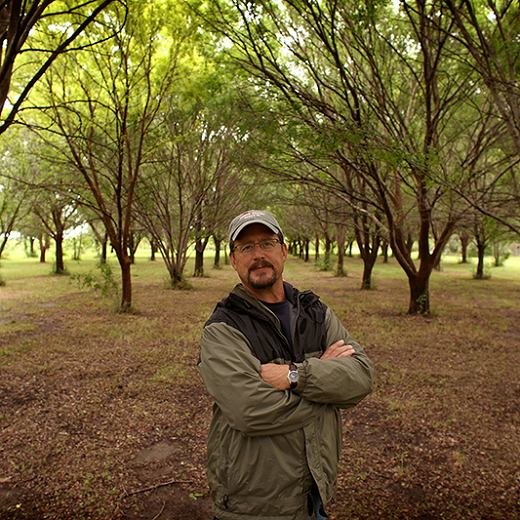
“Each of this year’s honorees contributed to the forestry community in exceptional ways, above and beyond the call of duty,” said Joe Fox, Arkansas state forester and NASF Awards Committee chair.
The NASF Awards Committee reviews dozens of worthy nominations for the association's lifetime and current achievement awards annually.
“The NASF recognition is very competitive,” said Bob Atchison, rural forestry program Coordinator for KFS. “I am glad to see Tim recognized for his hard work.”
McDonnell’s primary responsibilities are assisting communities with the management of their urban canopy, and he offers support for the nursery and arborist industry statewide. Tim is stationed at the John C. Pair Horticulture Center, which is both a regional and national horticulture research facility.
Tim has been involved in the Horticulture Industry for over 30 years with experience in Arboriculture, Landscape Design and Installation, Garden Center Operations and Nursery Production. He is both a Kansas Certified Nurserymen and Arborist. He has served as President of the Kansas Nursery and Landscape Association. Tim is an Ex-Officio Board Member for both the Kansas Arborist Association and the Kansas Nursery and Landscape Association. He also is an ISA Certified Arborist and is currently serving as the Midwest ISA Vice President.
Staley School welcomes leaders-in-residence from Senegal
The Staley School of Leadership Studies celebrates the DECLIC organization of Ziguinchor, Senegal, West Africa, as the 2018 Michael C. Holen Leaders-in-Residence.
Six members of Développement Citoyenneté Leadership Intégré and Communautaire, or DECLIC, join the K-State and Manhattan community for a four-week residency. They will be honored at the Staley School's eighth annual Spirit of Leadership event at 6:30 p.m. Friday, Sept. 28. 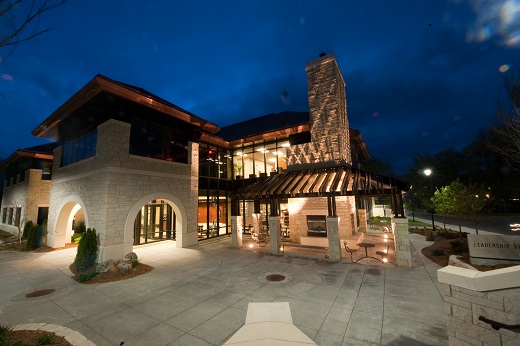
This residency is a continuation of the reciprocal partnership between the Staley School and DECLIC, an integrated civic leadership and community development organization with a mission to "Take the Leadership Challenge for the Common Good." Founded in 2016, the organization has trained more than 750 youth in leadership, social entrepreneurship, project cycle management, and much more. In their own local context, they are doing work which parallels the Staley School's mission to "develop knowledgeable, ethical, caring, inclusive leaders for a diverse and changing world."
Recently, Staley School faculty and DECLIC founders led a conference in Ziguinchor titled "Youth Leadership and Development in West Africa."
"Working with DECLIC is an important example of reciprocity in community partnerships," said Mary Tolar, director of the Staley School. "Although in different community and cultural environments, we share purpose in developing leadership capacity for community change."
This exchange, in addition to other Leading Change Institutes, is made possible through a gift from Dave and Ellie Everitt that established the institutes' cornerstone endowment.
Representing DECLIC are Haby Diallo, Salif Kanoute, Demba Kande, Jennifer Gbari, Francisca Napama and Adolphe Gomez. They will be in Manhattan through Oct. 13 and will participate in an array of activities, including visits to K-State classrooms, workshops with K-State faculty and staff, shadowing and service at area nonprofit programs, and consultation with university programs such as HandsOn Kansas State, Alternative Breaks and International Service Teams. Many opportunities will be available to interact with these guests throughout their stay, culminating in a public event at 3 p.m. Thursday, Oct. 11, in Town Hall at the Leadership Studies Building. Each of the leaders-in-residence will share their perspective on leading change in their home communities and reflections of their time in the local community.
The Michael C. Holen Leader-in-Residence award honors outstanding individuals who are exercising leadership in a range of organizational, professional and civic settings. Named in honor of the College of Education dean emeritus, leaders-in-residence come to campus to share experiences and engage in rich and challenging conversations with students and the Kansas State University community. Recipients of this award are celebrated at the annual Spirit of Leadership celebration, hosted by the Staley School of Leadership Studies. This event brings together alumni and friends of the School to connect with current students and faculty.
If you have any questions about this opportunity or would like to connect with the leaders-in-residence, please contact Chance Lee at chance@k-state.edu. Please join the Staley School of Leadership Studies in welcoming this group of remarkable leaders to our community and our university.
Kansas State University reaches significant step in multicultural center project
Kansas State University has secured more than $2.7 million for the multicultural center project, a substantial step in advancing student success, diversity, inclusion and social justice. 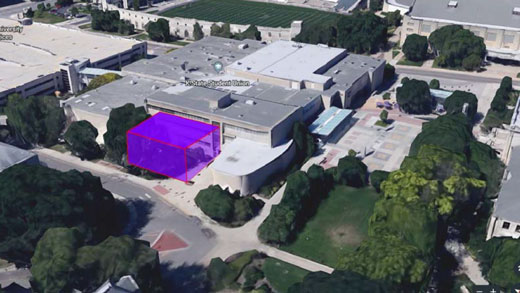
"Last fall, during the inaugural KSUnite event, we prioritized the multicultural center project for the year ahead and tasked a universitywide team to turn ideas and thoughts into action," said President Richard Myers. "In less than a year, we've made tremendous progress. The multicultural center will be a place for students, faculty and staff to learn from each other as well as serve as a symbol of how K-Staters work hard together to accomplish great things."
The Multicultural Center Project Action Team, a 28-member team of student, faculty, staff, administrators, alumni, KSU Foundation and community representatives, provided recommendations to the president's cabinet on the facility's use, location and design. The team proposes a 14,300-square-foot facility adjacent to the K-State Student Union.
"This center has been a dream for many generations of K-State students and supports our land-grant mission," said Pat Bosco, vice president for student life and dean of students. "We joined together with many students representing all kinds of voices and we have listened carefully. The center's central location will help fulfill the vision of a place where all people can unite for a better K-State."
The action team has been working with Albert Ray II, a 1993 Kansas State University graduate in architecture, planning and design and employee at Hollis + Miller Architects in Kansas City, for guidance. The KSU Foundation approved funding to contract with Hollis + Miller Architect for the preliminary design and specifications, which is expected by January 2019. The university will present the project for building approval to the Kansas Board of Regents in November.
"The Multicultural Center Project Action Team worked diligently throughout the summer to honor and build on the previous work for the center," said Adrian Rodriguez, associate vice president for student life. "They have developed a program statement that outlines the space and will continue to be involved in the planning process."
Makinsey McIntosh, a member of the Multicultural Center Project Action Team and multicultural affairs director for the Student Governing Association, said working on the center with other students and supporters has shown how important it is to the K-State community.
"As a team, we put in hours of brainstorming to not only fulfill the needs of our current multicultural students, but our future students as well for generations to come," said McIntosh, a senior in animal sciences and industry. "It is exciting to see this project move forward and to understand the progress we made this summer and over years of collaboration and persistence. I look forward to share what we have accomplished and more of our students' stories through this project."
The action team's recommendations include a welcome area; gathering, meeting and performance practice space; student and multicultural student organization group spaces; a kitchen; office space; and core support space, such as lactation room and student organization storage space.
"I'm proud of the work our group has done to move us forward toward realizing our multicultural center," said Spencer Wood, president of Faculty Senate and associate professor of sociology. "It is a vital component of our welcoming and inclusive vision and future of K-State as a transformative university for all of our students."
The university will start construction once a minimum fundraising threshold has been surpassed. The multicultural center project will be funded completely by private gifts.
"The fundraising thus far is a significant step in making the center a reality," said Greg Willems, KSU Foundation president and CEO. "The KSU Foundation will continue fundraising efforts once the project rendering is complete with space details and can be used to share an accurate description of the facility and its impact at K-State."
The university community and members of the public are invited to hear more about the project Tuesday afternoon, Oct. 9, at KSUnite activities in World War I Memorial Stadium. Events start at 1 p.m. with the Unity Walk from Bosco Plaza in front of the K-State Student Union to the stadium, followed by presentations by various speakers and an update on the multicultural center project.
K-State Faculty Highlight
Chemistry professor receives NSF funding to create synthetic enzyme-inspired catalysts
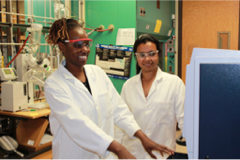 , assistant professor of chemistry, has received a three-year, $425,000 grant from the National Science Foundation to develop new catalysts with designs inspired by enzymes.
, assistant professor of chemistry, has received a three-year, $425,000 grant from the National Science Foundation to develop new catalysts with designs inspired by enzymes.
As nature's premier catalysts, enzymes catalyze reactions at rates up to a million times faster than existing industrial catalysts. Moreover, they do so with unparalleled selectivity, producing only the desired product. If industrial catalysts that perform as well as enzymes could be developed, then commercial reactions could be conducted at a greatly reduced cost, both in terms of energy consumption and waste generation.
Gadzikwa and her research group in the chemistry department are developing catalysts specifically for the efficient conversion of petroleum-based raw materials into chemical feedstocks for the pharmaceutical industry. Their project focuses on catalytic routes to chiral amines — molecules that come in left-handed and right-handed forms — and are frequently occurring components of biologically active molecules used as pharmaceuticals. Chiral amines of a single handedness are currently accessed via an inefficient industrial process.
To develop more economical routes to these valuable chemicals, the Gadzikwa lab is co-opting the strategies of enzymes and transferring them onto the solid-state scaffold of metal-organic framework materials. Enzymes work by strongly binding chemical reactants within shape-selective confined spaces that incorporate molecular structures that promote and direct the reaction. Metal-organic framework materials are organized molecular assemblies of metal ions and organic linkers whose interiors the Gadzikwa group will tailor to mimic the active sites within enzymes.
Along with developing important new routes for the production of catalytically active metal-organic frameworks, this project also will provide students from traditionally underrepresented groups in science with valuable opportunities to contribute to cutting-edge research. The Gadzikwa lab draws students from the Kansas State Louis Stokes Alliance for Minority Participation, the K-State Developing Scholars Program for first-generation university students, and the NSF Research Experiences for Undergraduates program.
Gadzikwa also is committed to broadening participation in science by leading public outreach activities that promote chemistry to Kansas' K-12 students.
K-State Student News
The Kansas State University Polytechnic Campus wants young women to feel more confident, empowered and aware after attending a new leadership workshop inspired by its social work program.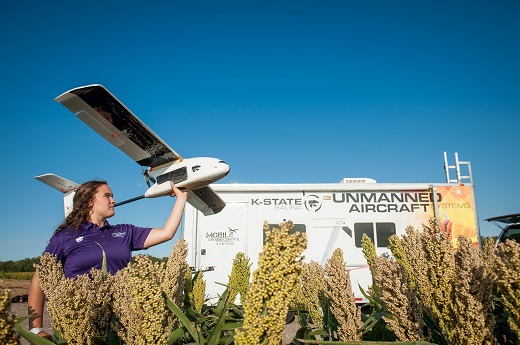
Camp GROW, or Girls Revolutionizing Our World, has been created for high school-age girls based on social work's six core values. It is a one-day workshop at Kansas State Polytechnic from 8 a.m. to 2:30 p.m. on Thursday, Nov. 8, that, through a variety of activities, group exercises and guest speakers, will help participants discover personal strengths, understand stress management, build leadership skills and learn how to serve others..
"High school can be a challenging environment to learn about yourself because, often times, it's about conformity, and we want to help young women develop valuable skills and qualities, and explore important topics that will serve them as they continue to grow and mature," said Cheryl Calhoun, social work instructor at Kansas State Polytechnic.
For social work's first core value — human relationships — Camp GROW attendees will participate in a group exercise focused on building a better civilization. For the second core value — competency — there will be a session on setting goals and planning for the future. The third core value — integrity — involves a roundtable of several guests sharing personal stories about substance use. Attendees will explore stress management and self-care with the fourth core value — dignity and worth of the person — and engage in a discussion on diversity for the fifth core value — social justice. Students will take part in a philanthropic project for social work's sixth core value — service — by making laundry soap from scratch for the local Laundry Love initiative, which will distribute the soap to those in need.
Camp GROW is open to any young woman in the ninth through 12th grades, and Kansas State Polytechnic encourages high schools and organizations to sign up as a group. There is no cost to attend and registration includes a T-shirt and lunch. Also available during the workshop will be resume help and information on paying for college.
Visit polytechnic.k-state.edu/campgrow to register. Explore Kansas State Polytechnic's social work bachelor's degree option at polytechnicexperience.com/academics/social-work.